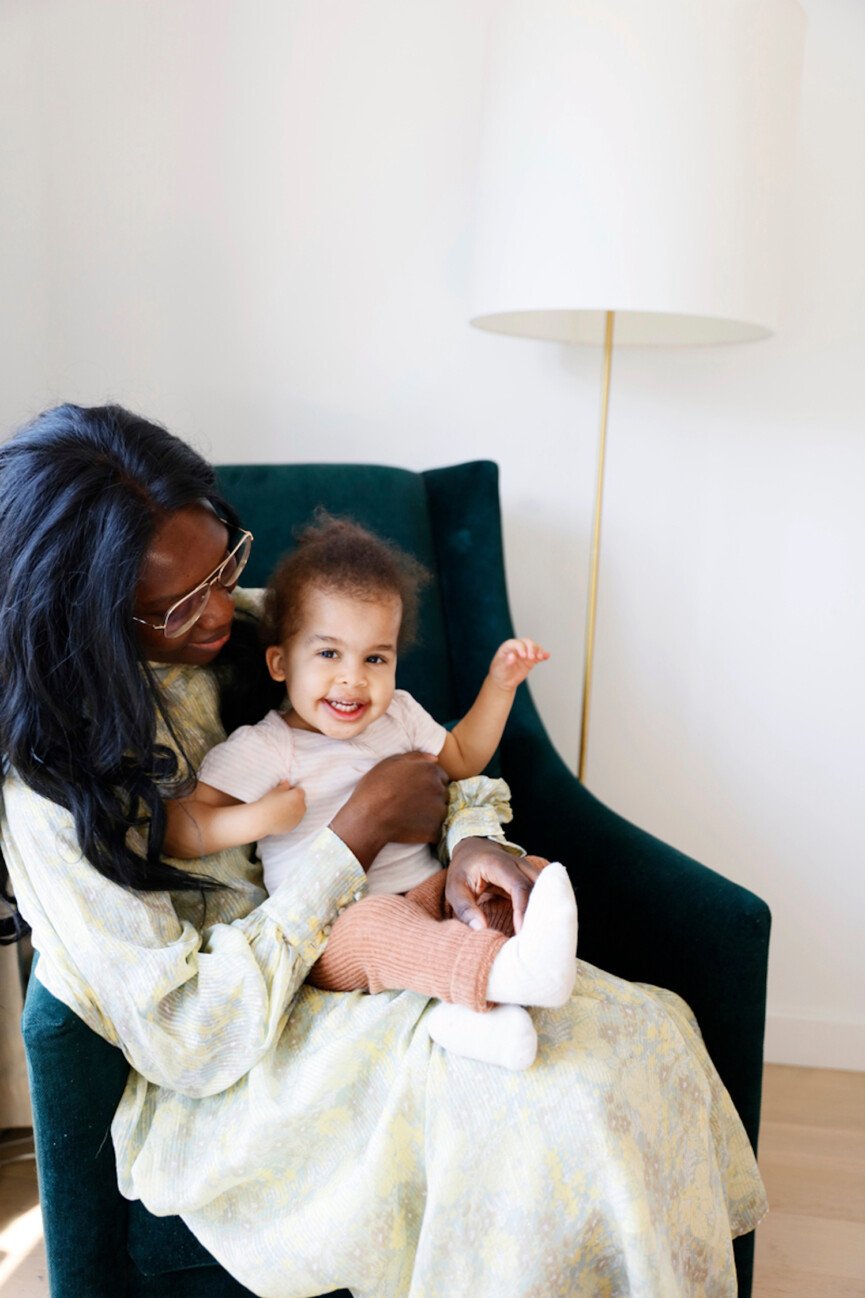I’ll be the first to admit that playing with my kids doesn’t come naturally to me. While other parents seem to effortlessly dive into imaginative play, I find myself overwhelmed by the chaos—loud noises, messes, and the need to fully let go and be silly. Often, I watch my husband engage easily. And honestly? This only highlights the disconnect I feel during these moments. This left me wondering: What’s holding me back from enjoying playtime? What steps can I take to bridge the gap? When you don’t like playing with kids, the feeling can be isolating. But trust me, you’re not alone.
I tapped family and child therapist Jenna Vivaldi, an Associate Marriage and Family Therapist specializing in family dynamics and trauma healing, to help me connect the dots. Together, we explored the reasons play can feel so challenging—and how to find meaningful ways to connect with my kids that feel natural to me.
Featured image from our interview with Marie Kouadio Amouzame by Belathée Photography.

Jenna Vivaldi, AMFT
Jenna Vivaldi is an Associate Marriage and Family Therapist in San Francisco specializing in helping children, teens, families, individuals, and couples heal trauma. Her current work focuses on empowering parents to give their children the invaluable gift of a regulated nervous system, creating a foundation for emotional well-being across generations.
Why might playing with kids not come naturally to some people?
There are various reasons why playing with your children may feel challenging. Here are a few key areas to consider:
Lifestyle factors. Play, creativity, and connection often emerge when your nervous system is regulated and feels safe. If you find it difficult to access these areas, it might indicate that your stress load is too high, whether from too many responsibilities, feeling unsupported, or lacking time for self-care.
Neurodivergence. For some neurodivergent individuals, certain forms of child’s play can feel understimulating or even boring.
Unresolved childhood trauma. Early experiences can profoundly influence our relationship with play as adults. Sometimes, children can trigger unresolved emotions or memories from our own childhood.
Perfectionism and unrealistic parenting expectations. Placing undue pressure on yourself to be your child’s constant entertainer can lead to unconscious resistance or resentment towards playtime. If it feels like a chore, it won’t be enjoyable for either of you! It’s actually healthy—and developmentally important—for children to play on their own without constant adult involvement. Ask yourself, “What expectations do I have for myself around playing with my child?”
How Partners Can Navigate Different Styles of Play and Connection
According to Psychology Today, men may find it easier to engage in play with their children due to both socialization and biological factors. Research suggests that men are more likely to compartmentalize responsibilities, meaning they can switch between work and family roles with greater ease. This mental separation helps them focus fully on play without carrying the stress of other tasks into the moment.
In contrast, many women experience a continuous mental load, juggling work, household responsibilities, and caregiving duties all at once. This ongoing multitasking can make it harder for women to fully immerse themselves in playful activities with their children. The constant sense of unfinished tasks or lingering obligations can create guilt or stress, preventing the carefree mindset that makes play feel natural.
Moreover, as highlighted by Smithsonian Magazine, men tend to engage more naturally in rough-and-tumble play. This not only feels intuitive for many fathers but also plays a crucial role in helping children regulate their emotions and develop important social skills. Fathers, often socialized to be more physical in their connections, may find this type of play more enjoyable and less mentally taxing.
Understanding these differences can help both parents discover their own meaningful ways to connect with their children. If roughhousing isn’t your thing—that’s okay! The key is finding moments that feel authentic. Whether that’s through storytelling, art projects, outdoor adventures, or quiet bonding at bedtime—find what works for you and your child. Remember: every parent brings something unique to the table. Figuring out what works best for you is part of the process.
5 Tips to Help When You Don’t Like Playing With Kids
If playing with your kids doesn’t feel natural, Vivaldi recommends starting with curiosity.
Follow the feelings. When your child asks you to play, notice what feelings arise. Is it resistance, boredom, overwhelm, or anxiety? These emotions can provide clues to deeper emotional blocks that may be interfering with your ability to enjoy play.
Identify the context. What types of play feel easier or harder for you? Is it roughhousing, imaginative play, arts and crafts, problem-solving games, or something repetitive? Understanding this can help you tailor your approach.
Reflect on adult play. Ask yourself, “What’s my relationship with play as an adult?” Do you make time for fun, creativity, or relaxation in your own life?
Reflect on childhood play. Consider your early experiences with play. Were you discouraged from being playful? Did you feel pressured to grow up quickly? Or perhaps you preferred solitary, structured activities? These memories can shape how you approach playing with your children now.
Make a Plan. Based on your insights, create a plan that aligns with your preferences and your child’s. For example:
- Marissa realized she gets bored playing turn-based games with her daughter because she’s neurodivergent and prefers activities like collecting things. Instead of feeling guilty, Marissa now plans mutual activities, like collecting sea glass at the beach, which they both enjoy.
- Jordan recognized feelings of overwhelm and disgust when playing with her active twin boys. Tracing those feelings led her to memories of being forced to take on adult responsibilities at a young age. She sought trauma therapy to resolve these feelings using Eye Movement Desensitization and Reprocessing (EMDR), which helped her reconnect with play.
How else could you connect with your kids instead?
Connection doesn’t only happen through play—it can be found in small, everyday moments. You can bond during a spontaneous kitchen dance party, by reading together before bed, creating art side by side, teaching a life skill, playing word games in the car, or having meaningful conversations at the dinner table. What matters most is the energy and presence you bring. If you’re happy and engaged, your child will feel it, too.
Connection doesn’t only happen through play—it can be found in small, everyday moments.
How to Build Memories Beyond Play
Parenthood is full of learning curves, and realizing that playing with your kids doesn’t come naturally is just another opportunity to grow. While it may not feel intuitive, taking small steps—whether it’s starting with structured games, shifting playtime outdoors, or giving yourself permission to be silly—can make a big difference.
The key is to keep trying and to remind yourself that play looks different for everyone. So, the next time you feel disconnected or out of your element, know that with a little practice, you’ll be building memories and stronger bonds in ways that feel authentic to you.

